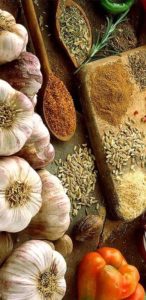From our list of herbs and spices, the following are recommended for Urinary Tract Problems:
Scroll down for links.
- Alfalfa Leaf
- American Ginseng
- Astragalus Root
- Barberry Root
- Black Walnut Hull
- Brazilian Guarana
- Bromelain
- Buchu Leaf
- Burdock Root
- Carrot
- Celery Seed
- Cinnamon
- Cleavers
- Collinsonia
- Corn Silk
- Cranberry
- Curcumin and Turmeric Root
- Damiana
- Dandelion Root
- Echinacea Angustifolia
- Echinacea Purpurea
- Garlic
- Ginkgo Biloba
- Goldenrod
- Goldenseal Root
- Grapefruit Seed
- Gravel Root
- Hydrangea
- Juniper Berry
- Licorice Root
- Milk Thistle
- Myrrh
- Nettle
- Oak Bark
- Oregon Grape Root
- Parsley Seed
- Pau Darco
- Pumpkin Seed
- Reishi Mushroom
- Sarsaparilla
- Saw Palmetto
- Shiitake Mushroom
- Tribulus Terrestris
- Turmeric Root
- Uva Ursi
- Willow Bark
Natural Cures and Remedies for Urinary Tract Problems
The formation of stones in the kidneys or urinary tract is a fairly common disorder. The stones are formed from the chemicals usually found in the urine such as uric acid, phosphorous, calcium and oxalic acid. They may vary in consistency from grit, sand and gravel-like obstructions to the size of the bird’s eggs.

Commission E approved Bishop’s Weed on March 13, 1986, but reversed itself as of April 15, 1994, condemning it because of excessive therapeutic risk and unproven efficacy (renal colic, spastic urinary tract disorders). “Ammi fruits may no longer be prescribed in Germany for this or any other indication” (SHT). Extracts and khellin and visnagin improve myocardial perfusion, increasing blood flow through the coronary vessels, making it useful for angina.
Alfalfa Leaf, American Ginseng, Astragalus Root, Barberry Root, Black Walnut Hull, Brazilian Guarana, Bromelain, Buchu Leaf, Burdock Root, Carrot, Celery Seed, Cinnamon, Cleavers, Collinsonia, Corn Silk, Cranberry, Curcumin and Turmeric Root, Damiana, Dandelion Root, Echinacea Angustifolia, Echinacea Purpurea, Garlic, Ginkgo Biloba, Goldenrod, Goldenseal Root, Grapefruit Seed, Gravel Root, Hydrangea, Juniper Berry, Licorice Root, Milk Thistle, Myrrh, Nettle, Oak Bark, Oregon Grape Root, Parsley Seed, Pau Darco, Pumpkin Seed, Reishi Mushroom, Sarsaparilla, Saw Palmetto, Shiitake Mushroom, Tribulus Terrestris, Turmeric Root, Uva Ursi, Willow Bark
Contraindications, Interactions, and Side Effects (Marsh Tea) – Not covered (AHP). Commission E reports herb contains an EO which is a potent irritant of the GI tract, kidneys and urinary tract; other toxic effects include abortion. Contraindicated in pregnancy (AEH). Ledol causes cramps, diarrhea, and paralysis (DEM).
pain, edema, and frequent urination. It does a superior job of cleansing the urinary tract, dissolving gravel and soothing inflamed mucous membranes.
Cystitis is an infection of the bladder, and it is as common as urethritis, which is an infection of the urethra (the narrow passage connecting the bladder to the outside of the body). If your symptoms consist of a burning sensation on passing urine, an urgency to pass water, and you need to pass water very often, you are most likely to be suffering from urethritis. If, on top of the above, you develop a pain above your pubic bone, become feverish and your urine becomes cloudy and smelly, you are most likely suffering from cystitis. Apart from taking the herbs described below, it is important to drink a lot of water (1 litre a day) to dilute the urine, as this will reduce the stinging and flush out the bacteria. Another common measure is to drink cranberry juice, preferably diluted and unsweetened, although this is only effective for some bacteria that can infect the urinary tract. You can also speed recovery by eating lots of parsley and celery, avoiding hot spices and alcohol, and taking yourself to bed with a hot water bottle.
Alfalfa Leaf
American Ginseng
Astragalus Root
Barberry Root
Black Walnut Hull
Brazilian Guarana
Bromelain
Buchu Leaf
Burdock Root
Carrot
Celery Seed
Cinnamon
Cleavers
Collinsonia
Corn Silk
Cranberry
Curcumin and Turmeric Root
Damiana
Dandelion Root
Echinacea Angustifolia
Echinacea Purpurea
Garlic
Ginkgo Biloba
Goldenrod
Goldenseal Root
Grapefruit Seed
Gravel Root
Hydrangea
Juniper Berry
Licorice Root
Milk Thistle
Myrrh
Nettle
Oak Bark
Oregon Grape Root
Parsley Seed
Pau Darco
Pumpkin Seed
Reishi Mushroom
Sarsaparilla
Saw Palmetto
Shiitake Mushroom
Tribulus Terrestris
Turmeric Root
Uva Ursi
Willow Bark
The urinary system in males and females is essentially the same and consists of the kidneys, ureter, bladder and urethra. The latter is much shorter in women than in men, which explains to an extent the higher prevalence of urinary tract infections in females. Infections of the urinary tract, if limited to its lower parts (urethra and bladder), can be successfully treated at home, but if they are persistent you must consult your GP or a medical herbalist to make sure that the infection doesn’t spread to the kidneys, which is potentially dangerous.
